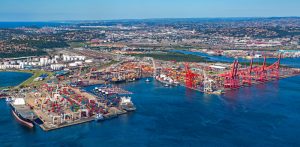 Efficient and interconnected supply chains play a vital role in driving economic growth and development, whereas the fragmentation of African supply chains impedes trade policies, costs, and potential, writes Adenike Onasoga, Head of Supply Chain at Kimberly-Clark, Nigeria. In this article, she writes about the pressing need on the continent to address the issues arising from fragmented supply chains and the importance of regional agreements in fostering integration and efficiency.
Efficient and interconnected supply chains play a vital role in driving economic growth and development, whereas the fragmentation of African supply chains impedes trade policies, costs, and potential, writes Adenike Onasoga, Head of Supply Chain at Kimberly-Clark, Nigeria. In this article, she writes about the pressing need on the continent to address the issues arising from fragmented supply chains and the importance of regional agreements in fostering integration and efficiency.
I have experienced firsthand how complex it is to ensure cost efficiency, improved lead time, regulatory compliance and product quality when transporting products across
borders (within and outside Africa) through both land and sea. This fragmentation is caused by a number of issues, ranging from security concerns, COVID-19 protocols, and the dislocation of trade and technological change.
According to the International Monetary Fund, a fragmented supply chain could cause a country to lose 0.2% of GDP in a limited fragmentation scenario, 7 percent in a severe scenario, and 12% of GDP in a complex situation, depending on the level of fragmentation. This manifests in the following supply chain dysfunctions:
Increased Costs
Fragmentation leads to inefficiencies, redundant processes and a lack of coordination among stakeholders. This results in increased transportation costs, longer delivery times and higher consumer prices. According to the United Nations Economic Commission for Africa (UNECA), intra-African trade costs are higher compared to
trade with other regions, primarily due to fragmentation.
Limited Market Access
Fragmented supply chains restrict access to larger markets within the continent. Many African countries primarily trade with non-African partners rather than with their neighbouring countries, leading to missed opportunities for growth and regional integration.
Lack of Scale
Fragmented supply chains prevent economies of scale, making it difficult for African businesses to compete globally. Limited access to inputs, expertise and technology
hampers their ability to expand operations and improve productivity.
Reduced Resilience
Fragmentation increases vulnerability to external shocks. When supply chains are not integrated, disruptions in one country can have a cascading effect on neighbouring economies, leading to supply shortages, production delays and economic instability.
Africa’s Regional Agreements Since 1963
Several regional agreements have been established in Africa to address the challenges of fragmentation and promote regional integration. Let’s assess their impact and
effectiveness.
Challenges and Progress
- African Continental Free Trade Area (AfCFTA): Launched in 2021, the AfCFTA aims to create a single market for goods and services across Africa. It has the potential to reduce trade barriers and enhance supply chain connectivity significantly, and, according to the African Union, to boost intra-African trade by over 50% by 2035. However, effective implementation, harmonisation of regulations, and infrastructure development are essential to maximising its benefits.
- East African Community (EAC): Comprising six member states, the EAC has made notable progress in harmonising policies, customs procedures and infrastructure development. The establishment of a common market, including the free movement of goods, services and people, has facilitated supply chain integration in the region. Intra-regional trade among EAC member states has been steadily increasing, reaching approximately 24% of total trade in 2020.
- Southern African Development Community (SADC): The SADC has made efforts to enhance regional integration through trade facilitation, infrastructure development and industrialisation. The SADC Free Trade Area promotes intra-regional trade and aims to reduce tariff and non-tariff barriers. In 2020, intra-SADC trade accounted for around 23% of the region’s total trade.
- Economic Community of West African States (ECOWAS): ECOWAS has made strides in regional integration, including establishing a common external tariff and the free movement of goods, services, and people. However, challenges persist in harmonising policies, reducing non-tariff barriers, and addressing infrastructure deficiencies. Intra-ECOWAS trade accounted for about 15% of total trade in 2020.
In the next issue of SmartProcurement, the author addresses the way forward on the issue of fragmentation in Part 2 of her article.























